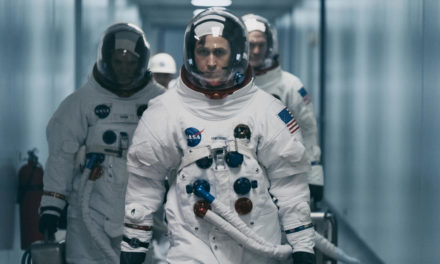As the new semester rolls in, we must bid farewell to the dog days of summer blockbusters until next year. Gone are the capes and cowls, and in come the period pieces, romantic dramas and premature Oscar-bait with which we must content ourselves until new horror films creep up in October. These genres are hard to denote one category to, and that’s how we end up with The Light Between Oceans, a rather run-of-the-mill romantic drama that
Set in post-World War I Australia, the film follows ex-soldier Tom Sherbourne (Michael Fassbender) as he attempts to return to civilian life by taking a job as a lighthouse keeper on an isolated island off the coast of the small town Janus. He falls in love with a young woman named Isabel Graysmark (Alicia Vikander), and the two decide to live at the lighthouse together immediately. After several failed pregnancies, the couple is about to abandon their hopes of having a family when a young baby girl and her dead father wash ashore on an adrift rowboat. Tom and Isabel blissfully raise the child as their own for several years until they return to Janus to find that the child’s mother, Hannah Roennfeldt, (Rachel Weisz) is determined to discover the fates of her missing husband and daughter.
On paper, you have a solid setup for an interesting cinematic discussion that explores paternity rights, biological versus surrogate parenting and the overbearing 20th-century pressures placed on women regarding pregnancy. Unfortunately, the film is too self-indulgent for its own good and fails to spend time developing these themes beyond cursory dialogue sprinkled here and there throughout its lengthy runtime.
Bloated is the most apt way to describe this film. For a movie clocking-in at 132 minutes, there is very little happening on screen. Director Derek Cianfrance’s wide landscape shots overlain with inner character monologues never cease to be gorgeous to to the eye and ear ; unfortunately, they also reveal how meaningless the film is underneath. Much of the dialogue is metaphorical nonsense, such as when they compare their love to the continuously pounding ocean. It may seem cute and endearing in a romantic drama geared toward teenagers, but comes across as really forced in a movie that attempts to be serious. It’s a director’s mistake to have the characters narrate their development rather than allow them to display it through their actions.
While on the topic, the characters are anything but natural. The biggest case is Vikander’s Isabel, whose characterization completely lacks any real exploration of her motivations. There are no useful flashbacks or exposition that really explore Isabel’s past, so there’s no grounding for her strong convictions toward keeping someone else’s child. As such, even though Vikander is a convincing actress, Isabel herself is never sympathetic to audiences in the slightest.
While this kind of bizarre characterization could work in the context of a darker, more unconventional film, The Light Between Oceans is an adaptation of M.L. Stedman’s romance novel, so we expect the film to have some kind of happy ending, which it does. The de facto villain of the film, the baby’s biological mother, has an abrupt change of heart in the last 15 minutes of the film without any real developments between her and the protagonists, leaving the central conflict over who has custody of the child — which was already introduced too late into the film — feeling anti-climatic.
The cast brings their A-game, and credit should be given for the unusual casting choices for this kind of film. Putting aside the fact that Fassbender and Vikander are currently in a relationship off-screen, the two are unlikely leads for a romantic drama. Fassbender typically plays stoic genre film leads (X-Men: First Class, Prometheus), so it’s interesting to see him play against his usual type here. Vikander made a name for herself last year in the excellent sci-fi thriller Ex Machina, where she played a near-emotionless android, so her complete 180 in this role really demonstrates her range as an actress.
As mentioned earlier, this film is beautiful to watch. Cinematographer Adam Arkapaw’s penchant for framing the island of Janus Rock through wide landscape shots and placing Fassbender squarely in the middle effectively captures the sense of isolation and loneliness Tom experiences for much of the film’s first act. The use of color in different scenes is also top notch, as Arkapaw paints the world in vivid reds and oranges to complement joyous moments, but the film is able to snap back immediately to the murky grey skies and rocks, returningus to the cold reality of life at Janus Rock.
The Light Between Oceans is ultimately too unremarkable to make an impression in any direction. It boasts inspired casting and breathtaking cinematography, but they’re buried under a paper-thin plot that’s screaming for some semblance of an original twist or perspective to dig into the deeper subtext available. In the end, it’s weekend-movie fodder for the baby boomer Academy-voting audience, but nothing more.
Grade: C-
Film Critic Vikrant Nallaparaju is a College Sophomore from Houston, Texas studying Anthropology and Human Biology. This is his second year writing for the wheel and the first serving as film a critic. When it comes to movies, he can usually be found watching the films of Joe Dante and lamenting the fall of John Carpenter.







I completely disagree with this review and reviewer. This movie is a three-box-of-kleenex kind of film. The kind of film you wear no make up to and see with your best girlfriends, or mom, daughter, and sister. Afterwards, you all go weep into a bowl of ice cream. You have to be in the mood for a good cry, and to ride the emotional waves of the film and cry openly (the ugly cry) to understand this movie. It is only understood from the point of view of the wife. If you try to review this movie or understand this movie from the perspective of the husband, then you are missing the point of the film. The storyline is not meant to be logically understood…you cannot understand the motives, because it is meant to be felt…to emotionally connect with the feelings of the wife. She has to bury two little babies, deal with devastating postpartum depression, and suddenly she FINDS a baby and her life immediately becomes whole again. You cannot view the film and pick it apart in judgment of the wife’s decisions, you need to view the film and give total empathy to the wife and freely go on her journey, right or wrong. Casting, acting, cinematography are all superb.